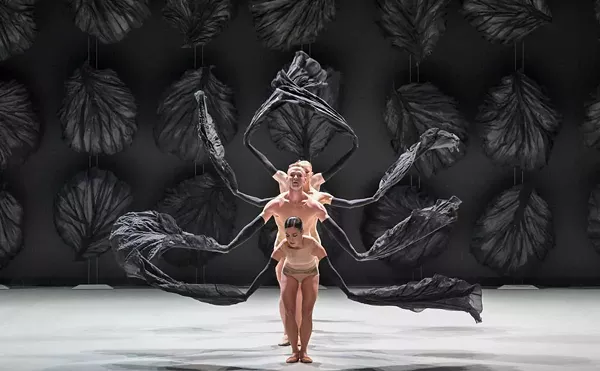
Audio By Carbonatix
[
{
"name": "GPT - Leaderboard - Inline - Content",
"component": "35519556",
"insertPoint": "5th",
"startingPoint": "3",
"requiredCountToDisplay": "3",
"maxInsertions": 100,
"adList": [
{
"adPreset": "LeaderboardInline"
}
]
}
]
For a Buddhist meditation on the cyclical nature of life (and the cyclical life of nature), this Korean film has a lot of old-fashioned entertainment value. Written, directed and edited by Kim Ki-duk, it’s divided into five sections for the title seasons. The seasonal references reflect the age of the protagonist as he grows from child monk (spring) to old master (winter), with a final prologue bringing the story full circle.
The child is the protégé of an older monk. The two of them live alone in a small monastery that floats on an isolated mountain lake. We’re not told their names or how they came to be linked, adding to the fable-like feel of the tale. In the first section we learn about the old monk’s teaching methods, which seem both tough and fair as he instills in the boy a sense of empathy toward the creatures that share the wilderness with them.
In the second section, the outside world enters the duo’s paradise in the form of a sick young woman who’s been brought to the old monk by her mother, who’s hoping for a cure. The girl has to stay at the monastery during her treatment; her presence drives the monk’s now-adolescent acolyte into a frenzy of lust. Soon the two young people are sneaking off into the countryside and screwing like rabbits.
This leads the young man to temporarily leave the monastery, not because of the old monk’s disapproval but because the younger monk wants to follow the girl who, now cured, must return to civilization. By the time the young man arrives back at the monastery, at the age of 30 (the fall sequence), he’s a fugitive, running away from a murder charge.
Kim’s story never goes where you think it’s going, and he manages to build quite a bit of suspense, or at least anticipation, as we wait to see what changes each season will bring to our unhappy hero. It’s a harsh story told against a lush backdrop, sad without being sentimental and instructive without being preachy.
In Korean with English subtitles. Showing at the Detroit Film Theatre (inside the DIA, 5200 Woodward Ave., Detroit), Friday and Saturday, April 30-May 1, at 7 and 9:30 p.m., and on Sunday, May 2, at 4 and 7 p.m. Call 313-833-3237.
Richard C. Walls writes about film for Metro Times. E-mail letters@metrotimes.com.





